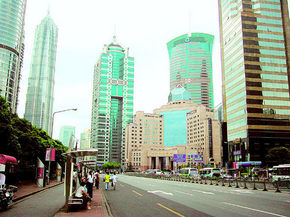 |
|
Shanghai Pudong, an iconic example of China's economic rise.
|
China passes law on foreign takeovers mid-stride
Carlyle XCMG Industrial Ltd. signed a contract on October 25, 2005 to purchase Xuzhou Construction Machinery Co. Ltd., a leader in China’s heavy equipment manufacturing industry. The U.S. multi-national enterprise planned to take over 85 percent of Xuzhou Construction Machinery’s stocks in a hostile merger and acquisition (M&A) attempt. However, when Carlyle’s plans were made known to the public, Chinese Internet sites were flooded with objections from citizens. Chinese netizens were concerned about three things. First, they thought that their country should not allow multi-national companies to "swallow up" their nation’s leading firms. Second, they worried about the safety of their national economy and about handing over their national assets to foreign countries at cut rates due to the uncertainty in the process of M&A discussion. Finally, adding to the anxiety of the Chinese netizens was Carlyle’s investment methods, which were unfamiliar to them. It is, in a sense, a Chinese version of the Lone Star story. Lone Star Funds, a Texas-based firm, took over Korea Exchange Bank in 2003, to accusations of price-fixing and corruption that are still being investigated. The difference is that in China, the problems surrounding the Carlyle’s bid came to public light before the merger was completed, and Chinese authorities listened. At a general conference of the Chinese People’s Political Consultative Conference in March, Li Deshui, director of China’s National Bureau of Statistics (NBS), warned about indiscriminate M&A bids by monopolistic multi-national companies. His remarks incited Chinese people’s objection to the merger of Carlyle and Xuzhou Construction Machinery.Amid the controversy, the Ministry of Commerce held three public hearings between July 17 and 19 to review the merger process. China’s six related ministries and agencies, including the Ministry of Commerce and the China Securities Regulatory Commission, then passed a law on foreign investors’ purchasing domestic companies. The law took effect on September 8. The content of subsequent consultations between the Chinese authorities and the U.S. fund have not been made public, but Carlyle announced on October 16 that it would purchase 50 percent - rather than 85 percent - of Xuzhou Construction Machinery’s shares. In addition, Carlyle will allow Xuzhou Construction Machinery to continuously maintain managerial rights. As seen with the Carlyle incident, there have been changes in China’s policies against foreign companies. The nation, which has seen rapid development in the last 25 years, is taking measures in preparation for foreign firms’ aggressive seeking of domestic companies. China’s Ministry of Commerce, in fact, plans to hold additional hearings over Germany’s FAG Group’s consolidation of Luoyang Bearing as well as France’s SEB Group’s merger of Supor. According to the 11th five-year (2006-2010) plan announced by the Ministry of Commerce on October 11, China will gradually abolish the existing preferential treatment for foreign companies during the period. An official of Samsung Economic Research Institute’s Chinese office advised companies that want to engage in business activities in China to carefully review the nation’s economic laws and policies, citing its significantly changing investment environment. [englishhani@hani.co.kr]





